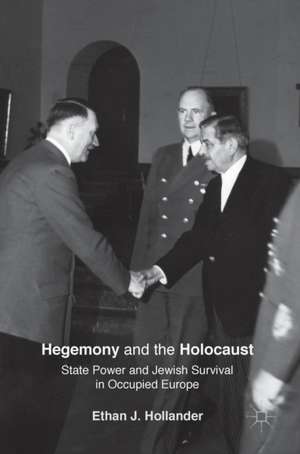Hegemony and the Holocaust: State Power and Jewish Survival in Occupied Europe
Autor Ethan J. Hollanderen Limba Engleză Hardback – 2 noi 2016
| Toate formatele și edițiile | Preț | Express |
|---|---|---|
| Paperback (1) | 583.13 lei 6-8 săpt. | |
| Springer International Publishing – 20 iun 2018 | 583.13 lei 6-8 săpt. | |
| Hardback (1) | 784.92 lei 6-8 săpt. | |
| Springer International Publishing – 2 noi 2016 | 784.92 lei 6-8 săpt. |
Preț: 784.92 lei
Preț vechi: 957.22 lei
-18% Nou
Puncte Express: 1177
Preț estimativ în valută:
150.19€ • 157.24$ • 124.28£
150.19€ • 157.24$ • 124.28£
Carte tipărită la comandă
Livrare economică 05-19 aprilie
Preluare comenzi: 021 569.72.76
Specificații
ISBN-13: 9783319398013
ISBN-10: 3319398016
Pagini: 294
Ilustrații: XV, 312 p. 7 illus.
Dimensiuni: 148 x 210 x 23 mm
Greutate: 0.53 kg
Ediția:1st ed. 2017
Editura: Springer International Publishing
Colecția Palgrave Macmillan
Locul publicării:Cham, Switzerland
ISBN-10: 3319398016
Pagini: 294
Ilustrații: XV, 312 p. 7 illus.
Dimensiuni: 148 x 210 x 23 mm
Greutate: 0.53 kg
Ediția:1st ed. 2017
Editura: Springer International Publishing
Colecția Palgrave Macmillan
Locul publicării:Cham, Switzerland
Cuprins
1. Introduction: Swords or Shields?.- 2. Scandinavia: The Banality of Goodness.- 3. Western Europe: The Politics of Judgment.- 4. Eastern Europe: The Benefits of Alliance.- 5. Conclusion: German Hegemony, State Power, and Jewish Survival.
Notă biografică
Ethan J. Hollander is Associate Professor of Political Science and the 2015-16 McLain-McTurnan-Arnold Research Scholar at Wabash College, USA. He conducted research for this project at the Zentrum für Antisemitismusforschung in Berlin, Germany. His research and teaching interests include Ethnic Conflict and Genocide, Comparative Politics, and International Relations. He received his PhD from the University of California, San Diego, USA.
Textul de pe ultima copertă
This book explains why more Jewish people survived in some German-occupied countries compared to others during World War II. Hollander demonstrates that collaborators sometimes played a surprising role in ensuring Jewish survival. Where high-ranking governing officials stayed in their countries and helped Nazi Germany, they could often “trade” their loyal cooperation in military and economic affairs for inefficient or incomplete implementation of the Final Solution. And while they sometimes did this because they had sincere moral objections to Nazi policy, they also did so because deporting local Jews was politically unpopular, because they regarded it as less important than winning the war, or because deporting Jews meant that the collaborators gave up potentially profitable opportunities to exploit them. This unique book has important implications for our understanding of state-sponsored violence, international hierarchy, and genocide, and it raises harrowing moral questions about the Holocaust and the nature of political evil.
Caracteristici
Offers a revealing case study on the limits of coercion and the power of weak states in international negotiation Analyzes varieties of Nazi governmental administration in German-occupied countries in connection with Jewish survival rates Bridges the disciplines of history and comparative politics to provoke new understandings of European political history and international relations













